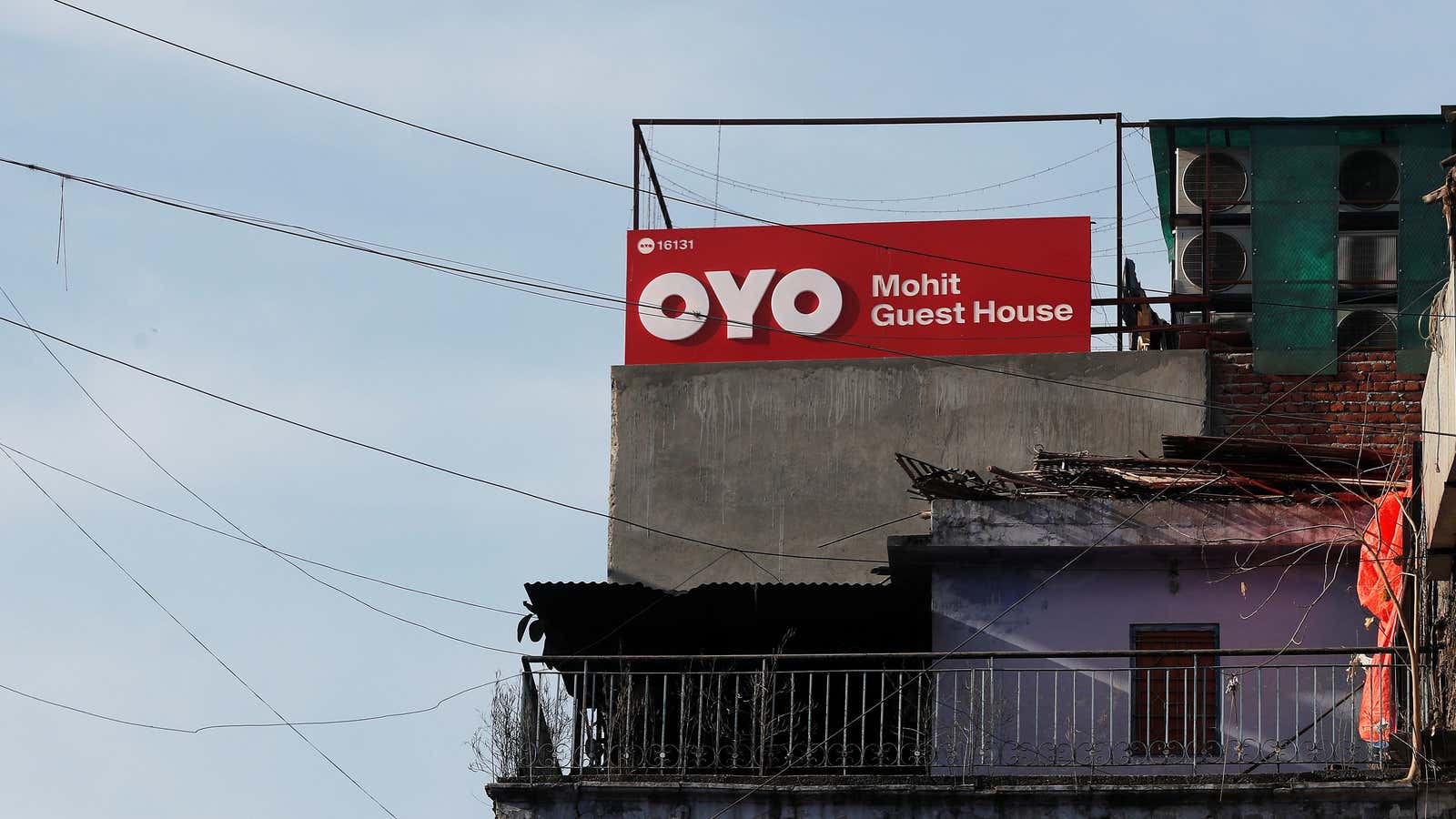Budget hotel chain Oyo knows the skeptics are lining up.
Oyo Hotels & Homes is widely thought to be the new crown jewel in the $100 billion SoftBank Vision Fund portfolio, following the failed IPO and meltdown of office-rental company WeWork, another SoftBank investment. That status has brought a new level of scrutiny to Oyo and its 26-year-old founder and CEO, Ritesh Agarwal.
Critics have labeled Oyo—a high-flying company with a charismatic CEO and aggressive expansion plans—the “next WeWork.” Oyo is now scrambling to recast the story around sustainable growth and profitability, a sharp change from last fall when Agarwal said the company didn’t even have guidance on when it might be profitable. Less than two months into 2020, Oyo has already laid off more than 2,100 workers across India, China, and the US, and reportedly plans to cut another 1,200 in India over the coming months.
“Frankly, we understand that there is a tremendous amount of focus on us,” Aditya Ghosh, an Oyo board member and former head of the India business, said in an interview last week. “We think we’re going at the right pace, but we also understand and are acutely aware of the fact that we have to earn our stripes every day.”
Founded in 2013, Oyo is effectively a hotel franchise. It finds budget hotels with little visibility or online presence, then renovates and refurbishes them to operate under the Oyo brand. Oyo also runs a short-term apartment rentals business. Oyo says it has more than 43,000 hotels with more than 1 million rooms, and operates in more than 800 cities in countries including India, the US, the UK, and Japan.
On paper, Oyo is India’s second-most valuable startup, behind only payments company Paytm. Oyo received its $10 billion valuation late last year in a $1.5 billion funding round whose sole participants were Agarwal and the Vision Fund. Agarwal borrowed $2 billion from banks for that deal in loans personally guaranteed by SoftBank chief Masayoshi Son. Before that, Oyo was valued at $5 billion in a venture round completed earlier in 2019 and backed by a wider slate of investors.
Parallels to WeWork aren’t hard to draw. Both Oyo and WeWork secured rich paper valuations in private financings led by SoftBank. Both had charismatic cofounder-CEOs who wowed Son with their vision and ambition. Both spent heavily on new locations and racked up losses amid frenzied global expansion. Oyo even dabbles in co-working.
Oyo’s model found quick success in India. From there, the company expanded to Malaysia, Nepal, and China, before pushing into the UK in 2018. “Oyo grows 10x faster than the world’s biggest hotel chain, Marriott,” Son told SoftBank investors on a call last August.
Less clear was whether a capital-intensive model of sprucing up budget hotels would translate well to other markets. In the UK, for instance, Oyo invested in everything from new signs and paint jobs for hotels to repairing the electric and plumbing at some properties.
Oyo’s contracts with hoteliers differ, but generally involve Oyo either taking a share of revenue or collecting fees from hotel owners. Oyo manages its hotels through a system of incentives and penalties it calls the “3C” program. Incentives can range from making faster payments to the hotel to sending staff on cruises, while penalties include raising the fees Oyo charges and removing underperforming hotels from the platform. Oyo recently cut more than 1,000 low-performing hotels from its network in India.
On Feb. 17, Oyo shared limited financial results for its 2019 fiscal year and held a call with executives to discuss those results, an unusual disclosure for a privately held company. Oyo said it lost $335 million in 2019 on $951 million in revenue. In its home market of India, Oyo said it lost $83 million on $604 million in revenue.
The day before, Bloomberg had published a lengthy report on Oyo and Son’s foundering Japan ambitions. Bloomberg reported that Oyo’s apartment-rentals unit had just 7,500 rooms in Japan compared to a target of 1 million set in March 2019. A few days before that, analysts on SoftBank Group’s latest earnings call had grilled Son about complaints lodged by hoteliers against Oyo and whether SoftBank had pushed Oyo too hard. “I don’t feel that way,” Son replied. “If people can grow and they have a room to grow, I think money can be very useful.”
